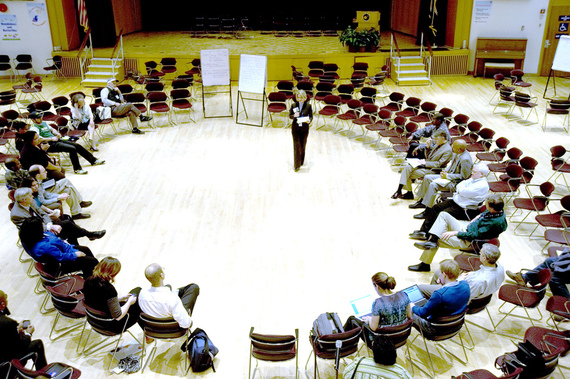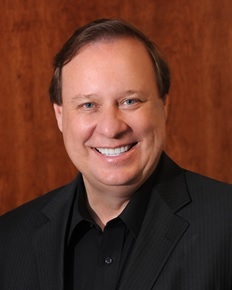
by Doug Kirkpatrick, US Partner at NuFocus Strategic Group
Item: Arvind Suresh, writing in Discover magazine, reports that Jacob Sherson, an associate professor of Physics at Aarhus University (AU) in Denmark, and his colleagues have been working on ways to develop quantum computers by efficiently manipulating atoms with lasers. They are working to transcend the challenge of developing ever-smaller transistors to crunch bits of information in one of two states, 0 or 1. Quantum computers, based on quantum systems (atoms, electrons, photons) allow bits to exist as 0 and 1 simultaneously, allowing for massive, parallel increases in computer power. One challenge in manipulating atoms is "sloshing", where a sudden move with a laser "tweezer" may cause an atom to slosh in the tweezer and produce calculation errors. Inspired by a Danish tech radio show, Sherson decided to gamify the challenge and invite citizen scientists to find the best solution. The project, Quantum Moves, created games where players manipulated atoms as efficiently as possible. By mapping the mouse positions of successful players, thousands of scientists can solve the problem far faster than one lonely researcher trying to find the perfect algorithm.
Item: Atul Gawande, in The Checklist Manifesto, describes how Peter Pronovost, a critical care specialist at Johns Hopkins Hospital decided to try a radical idea: a checklist for ICU doctors. He created a simple, five-point checklist for doctors to avoid infections when putting in a central line (first point: wash hands with soap!). For one month, nurses observed how often doctors followed each step. In more than a third of patients, doctors skipped at least one step. The following month, Johns Hopkins administration authorized nurses to stop doctors if they saw them skip a step--a revolutionary move in the hierarchical hospital environment. Over the next year, the ten-day line infection rate dropped from 11 percent to zero.
Item: James Surowiecki, author of The Wisdom of Crowds, describes the hunt for USS Scorpion, a nuclear submarine that disappeared in May 1968 somewhere in the North Atlantic. Based on the last radio contact, the Navy began searching a radius twenty miles wide, a nearly hopeless task. Fortunately, naval officer John Craven had a better idea. He concocted a multitude of potential scenarios, and then concocted a team with a diverse range of skills and backgrounds. He asked the team members to give their best individual guesses regarding Scorpion's fate, and place bets on the likelihood of each scenario with bottles of Chivas Regal as prizes. Craven built a composite scenario built on all the guesses. Five months after Scorpion's disappearance, this intelligence, built on the collective wisdom of Craven's team, enabled a navy ship to find Scorpion 220 yards from where the group (but no individual group member) predicted it would be.
Like the quantum computers of the future, where one relatively small quantum machine could have more computing power than all conventional computers combined, quantum organizations will creatively and effectively deploy crowdsourcing, gamification, voice activation, collective intelligence and myriad other social technologies to let people bring their entire brains to work. As Chuck Blakeman wrote in Inc. magazine: "In the Participation Age, which is already upon us, everybody is getting their brain back, and work once again is becoming a meaningful, integrated part of our lives, not something we put up with to make money."
The benefits of participation are real: in the book Firms of Endearment: How World-Class Companies Profit From Passion and Purpose, the authors examine how to build high-performance companies on love, involving all stakeholders (all of whom, coincidentally, happen to be human beings). They found that humanistic firms of endearment (FoEs) maximize value to society as a whole, not just to shareholders, by creating emotional, experiential, social and financial value. Publicly held FoEs returned 1,026 percent for investors over the 10 years ending June 30, 2006, compared with 122 percent for the S&P 500. FoE Costco, for example, pays people 40% more than Sam's Club, yet generates significantly more profit per employee.
Powerful social technologies are finding their way into companies and organizations around the world. Open Space, detailed by discoverer Harrison Owen in his book Open Space Technology: A User's Guide, has been practiced in over 100,000 different meetings in 160 countries, involving self-organizing groups of between 5 and 2100 participants. In a safe, diverse Open Space environment, participants self-organize and grapple with the burning issues most important to them, where collective wisdom can emerge.
The World Café, a process discovered by Juanita Brown and David Isaacs in 1995, has also found resonance around the world as a social technology to drive multi-stakeholder engagement. The World Café publishes an Impact Map that shows its influence around the world.
Rod Collins, former Chief Operating Executive of the Blue Cross Blue Shield Federal Employee Program and author of Wiki Management: A Revolutionary New Model for a Rapidly Changing and Collaborative World, shares an exercise he calls the "Elegant Set", a method of quickly aggregating the collective intelligence in a room of diverse stakeholders. Keith McCandless and Henri Lipmanowicz, co-authors of The Surprising Power of Liberating Structures: Simple Rules to Unleash A Culture of Innovation, describe several simple yet powerful exercises designed to unleash innovation and performance through engagement.
To the degree they are deployed, liberating social technologies will exert tectonic pressure on traditional organizations to, well, liberate people. Once exposed to these technologies, people will expect to have a voice and expect their voice to be heard. Given the typically low employee engagement levels measured by numerous researchers, it would appear that organizations have little to lose by listening.
Doug Kirkpatrick is the author of Beyond Empowerment, The Age of the Self-Managed Organization. He is an organizational change consultant, TEDx and keynote speaker, executive coach, writer, educator and SPHR.
He played the first season of his business career in the manufacturing sector, principally with The Morning Star Company of Sacramento, California, a world leader in the food industry, as a financial controller and administrator. He now engages with the Morning Star Self-Management Institute, Great Work Cultures, The Center for Innovative Cultures and other vibrant organizations and leaders to co-create the future of management. Contact Doug at Twitter @Redshifter3.
Picture of Open Space at NASA Goddard Space Flight Center
By Credit: NASA/GSFC/Debbie McCallum - http://www.flickr.com/photos/nasa_goddard/4465372408 Transferred from en.wikipedia Original uploader was Kevin Hayes at en.wikipedia, CC BY 2.0, https://commons.wikimedia.org/w/index.php?curid=17842414
